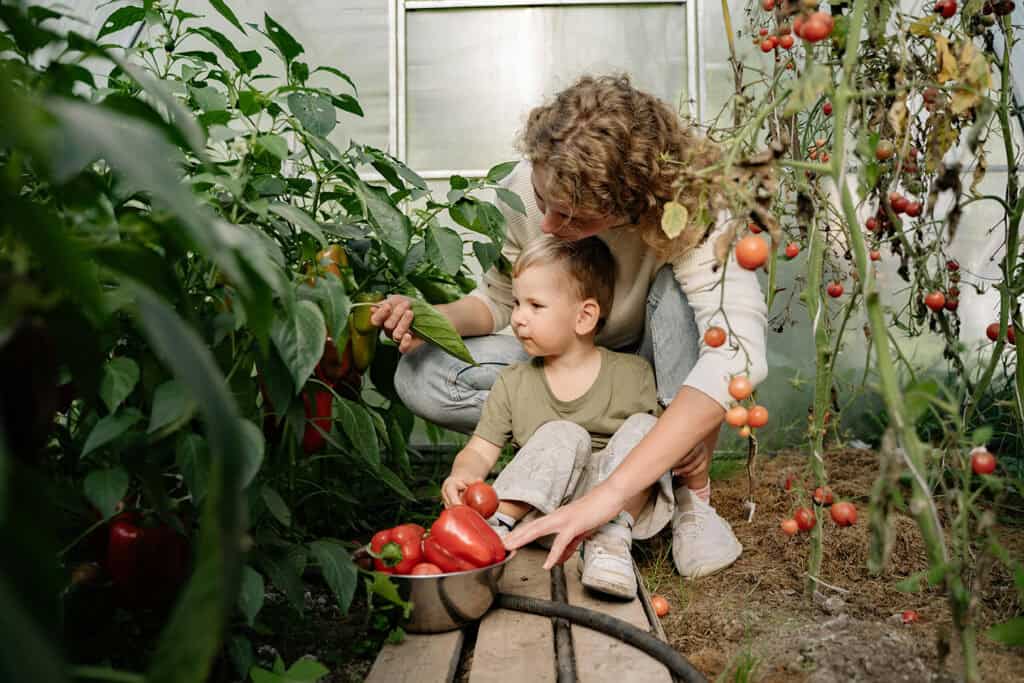
Do you want to ensure your child grows up healthy and happy?
Self-care is essential for children, as it builds a strong foundation for both their mental and physical health. As parents, we often worry about our children’s well-being, and introducing self-care practices early can help them learn to manage their emotions and develop vital problem-solving skills.
In this article, we will explore the importance of self-care for kids, 7 self care options and share practical tips to encourage healthy habits.
You’ll discover the benefits of daily self-care routines, from enhancing resilience and confidence to promoting better sleep and creativity.
By the end, you’ll be equipped with the tools to help your child thrive, ensuring they are prepared to face life’s challenges with confidence and independence.
Here Are 7 Self-care Practices for Kids:
- Daily Hydration: Encourage kids to drink water to stay focused.
- Healthy Eating: Promote balanced meals with fruits, veggies, and proteins.
- Mindful Breathing: Teach simple breathing exercises to help with stress.
- Exercise and Play: Engage kids in fun physical activities to boost fitness.
- Creative Activities: Encourage drawing or crafting to enhance creativity.
- Bedtime Routine: Establish a calming routine for better sleep.
- Limit Screen Time: Set boundaries on-screen use to promote healthier habits.
Why Self-Care is Important for Children?
Self-care is important for children because it helps them build healthy habits for both their mental and physical health. Teaching a Self Care Checklist from a young age helps them learn to manage their own emotions and develop problem-solving skills.
Regular self-care practices give younger children the emotional support they need to face challenges with confidence. A good self-care routine encourages kids to develop strong self-care habits, making them more independent.
It also helps them interact positively with family members. Starting self-care early sets a strong foundation for their future, promoting overall wellness.
Here’s a list of unique benefits of self-care for kids:
- Builds Resilience – Kids develop the ability to bounce back from challenges.
- Improves Focus – Self-care activities enhance concentration in school and tasks.
- Boosts Confidence – Helps children feel more secure and capable.
- Encourages Independence – Kids learn to manage their daily routines on their own.
- Promotes Better Sleep – Self-care can include bedtime routines that lead to better sleep.
- Helps Creativity – Time for creative activities supports imagination and problem-solving.
- Reduces Anxiety – Regular self-care helps lower stress and anxiety levels.
See also Responsibilities Quotes for Students: 50 Inspiring Sayings for Success
Self-Care Habits for Kids
1. Daily Hydration

Daily hydration is a key part of self-care for kids. Drinking water helps improve a child’s mood and energy throughout the day. It’s one of the easiest self-care tasks and can be turned into a fun routine.
Encourage your child to drink water with meals and after self-care activities like playing or doing an obstacle course.
Setting up self-care reminders helps them remember. Building healthy habits at a young age makes kids more aware of their needs. Help your child learn this important habit as part of daily self-care routines for a healthy lifestyle.
- Ages 1-3: About 4 cups (1 liter)
- Ages 4-8: About 5 cups (1.2 liters)
- Ages 9-13: About 7-8 cups (1.6 to 1.9 liters)
Here are tips for managing kids’ drinking habits:
- Remind them gently: Give self-care reminders throughout the day.
- Set a daily water goal: Use fun bottles to track how much they drink.
- Create a water schedule: Offer water at specific times, like after meals or playtime.
- Incorporate water-rich foods: Include fruits like watermelon or cucumber.
- Use flavored water: Add slices of fruit for natural flavor.
- Lead by example: Drink water with your child to encourage healthy habits.
- Make it fun: Use special cups or straws to make drinking water enjoyable.
- Praise and reward: Celebrate when they reach their daily hydration goal.
2. Healthy Eating
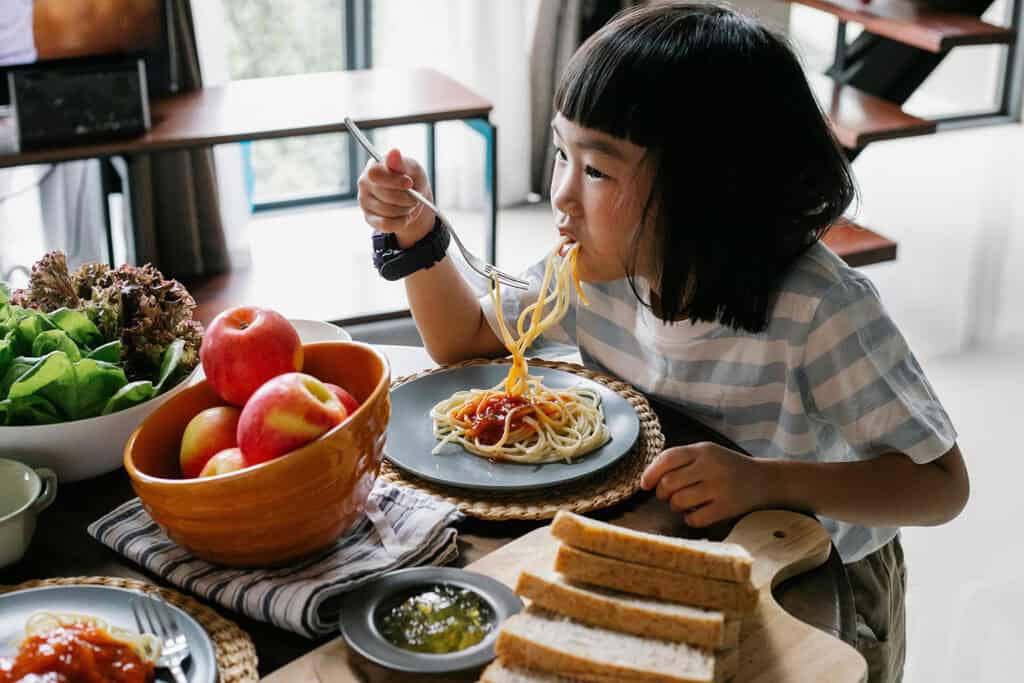
Healthy eating is a key part of self-care for kids. A good diet plan helps them grow strong and healthy. By choosing healthy snacks over unhealthy foods, children learn how to care for their bodies.
Introducing healthy foods through fun visual aids and positive reinforcement can make the process enjoyable. These simple self-care activities teach children to develop healthy self-care habits early.
By promoting physical self-care through good food choices, they support their overall health and well-being. It’s important to help kids form these habits for a happy and healthy future.
Here’s a list of the best healthy food options for kids:
- Popcorn: Air-popped popcorn is a low-calorie, high-fiber snack option.
- Fruits: Apples, bananas, berries, and oranges are great for snacks.
- Vegetables: Carrot sticks, cucumber slices, and bell pepper strips are crunchy and nutritious.
- Whole Grains: Oatmeal, brown rice, and whole-grain bread provide fiber and energy.
- Lean Proteins: Chicken, turkey, beans, and tofu support muscle growth.
- Dairy: Low-fat yogurt, milk, and cheese are good sources of calcium.
- Nuts and Seeds: Almonds, walnuts, and sunflower seeds offer healthy fats and protein (ensure no allergies).
- Healthy Fats: Avocado and olive oil can be added to meals for extra nutrition.
- Nut Butter: Peanut butter or almond butter spread on whole-grain bread is a tasty option.
- Homemade Smoothies: Blend fruits and spinach with yogurt for a nutritious drink.
3. Mindful Breathing
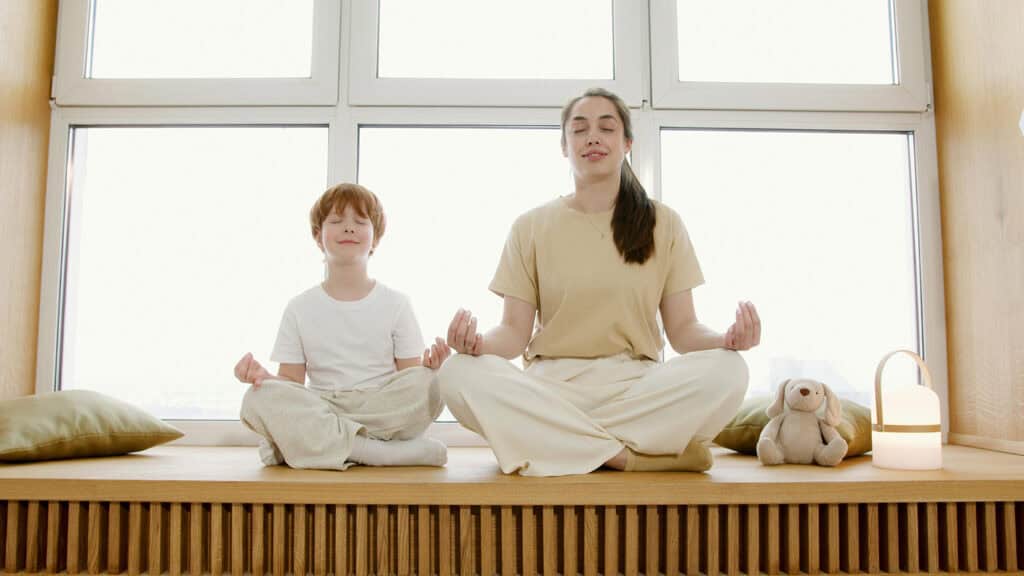
Mindful breathing is a great self-care practice for kids. It helps them relax and manage stress. Kids can use meditation tools like stress balls to focus. Start by sitting comfortably.
Inhale deeply through the nose, then exhale slowly through the mouth. This is called belly breathing. Encourage them to take a few deep breaths whenever they feel overwhelmed.
You can also turn it into fun challenges, like holding your breath for a few seconds. Mindful breathing helps improve mental health and boosts problem-solving skills. It’s a simple but effective stress management technique that kids can use anytime.
Here’s a list of steps for teaching breathing techniques to kids:
- Choose a Quiet Space: Find a comfortable spot free from distractions.
- Get Comfortable: Have kids sit cross-legged or lie down.
- Explain Deep Breathing: Tell them they’ll take deep breaths to relax.
- Place a Hand on the Belly: Have them put one hand on their belly.
- Inhale Deeply: Instruct them to breathe in through the nose for three counts.
- Feel the Belly Rise: Ask them to notice their belly rising.
- Exhale Slowly: Have them breathe out through their mouth for four counts.
- Repeat: Encourage them to do this for a few minutes.
- Visualize Calmness: Suggest imagining a peaceful place while breathing.
- Discuss Feelings: Talk about how they feel afterward.
4. Exercise and Play
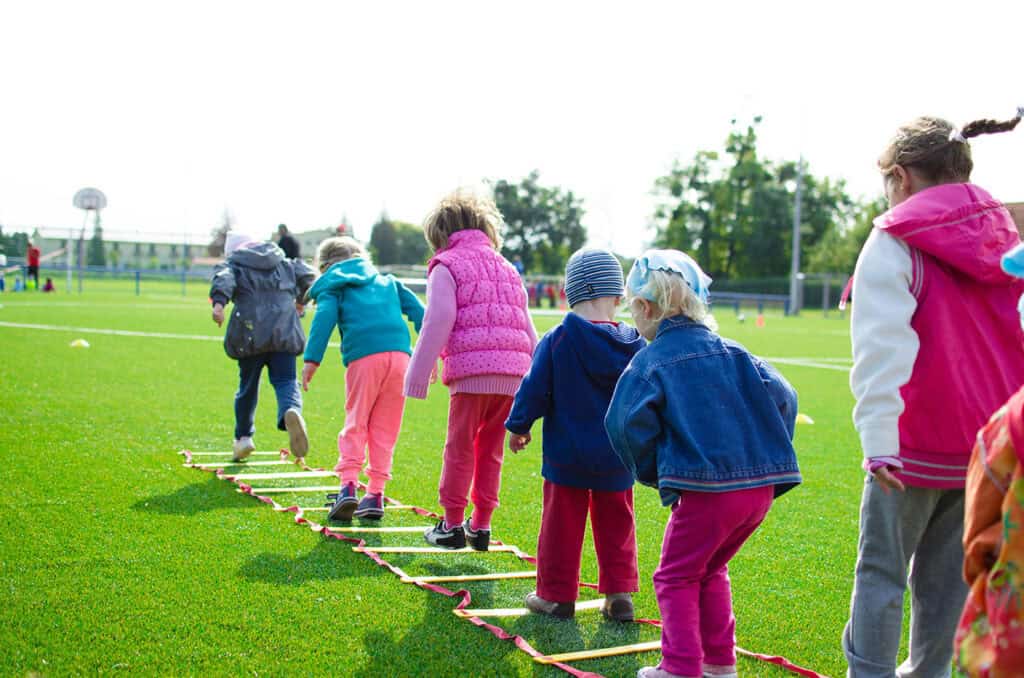
Exercise and play are vital self-care activities for kids. When children play sports or join team activities, they move their bodies. This helps their overall health. Playing sports also teaches kids important social skills.
They learn how to work with others and build friendships. Young people benefit from physical activity because it keeps them fit and strong. It is a fun way for kids to spend time.
Whether it’s running, jumping, or kicking a ball, these activities are essential for their growth. By staying active, children develop healthy habits that last a lifetime. Exercise is not just good for the body; it also supports mental health.
Here’s a list of fun play and exercise activities for kids:
- Scavenger Hunts: Find items outdoors for fun movement.
- Obstacle Course: Use cushions and chairs for a fun challenge.
- Dance Party: Have a dance-off to their favorite music.
- Nature Walks: Explore local parks or trails together.
- Biking: Ride bikes around the neighborhood or park.
- Swimming: Enjoy pool or beach time for exercise.
- Tag Games: Play freeze tag or capture the flag.
- Jump Rope: Have fun and improve coordination.
- Hula Hooping: Great for balance and exercise.
- Kids Yoga: Try simple poses for flexibility.
5. Creative Activities
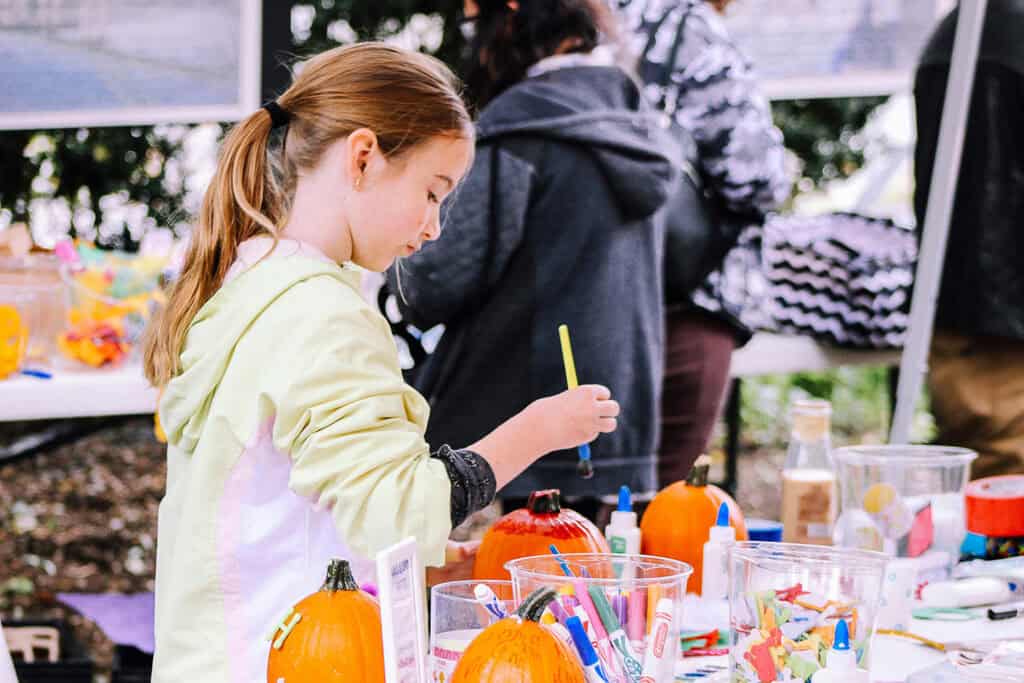
Creative activities help kids practice self-care while having fun. These activities can include drawing, painting, or making crafts, which teach kids self-awareness and boost well-being.
Self-care tips for children often recommend creative play as a way to relax and express themselves. Building a healthy self-care routine early helps them develop lifelong habits.
As part of a child’s self-care routine, activities like coloring, crafting, or storytelling are perfect for keeping their minds active. Including creative self-care activities also ensures kids won’t lose interest and stay engaged while developing their physical and emotional well-being.
6. Bedtime Routine

A bedtime routine helps kids sleep early and meet their physical and emotional needs. It supports better emotional regulation and self-awareness at an early age.
Simple self-care activities like brushing teeth, reading, and a warm bath can develop positive self-care habits.
Practicing self-care every night boosts self-esteem and improves physical health. A calming routine helps kids feel safe, rested, and ready for the next day.
This process is key in teaching children how to sleep early and manage their emotions, setting the foundation for a lifelong self-care routine. Bedtime routines can make kids feel more balanced and secure.
Here’s a list of 10 bedtime routine ideas for kids:
- Hugging a stuffed animal – Provides emotional comfort and security.
- Listening to calming music – Helps relax before sleep.
- Gentle stretching or yoga – Eases muscle tension.
- Gratitude practice – Reflecting on positive moments from the day.
- Setting out clothes for the next day – Prepares them mentally for tomorrow.
- Dim the lights early – Signals the body it’s time for rest.
- Bedtime story recording – Listening to their favorite story in a soothing voice.
- Creating a cozy sleep environment – Arranging pillows and stuffed animals.
- Journaling or drawing – Express thoughts or emotions from the day.
- Breathing exercises – Calming deep breaths before bed.
7. Limit Screen Time

Limiting screen time is important for a child’s self-care routine. It helps kids practice self-care and build healthy self-care habits from an early age. Reducing screen time allows more physical activity and better emotional regulation.
Kids may lose interest in screens and engage in self-care tips like playing outside or doing chores for teenagers. This balance supports self-awareness, self-esteem, and overall well-being.
Incorporating screen limits into the Family Weekend Schedule encourages a better routine. Self-care teaches kids important life skills, helping them develop into healthier individuals.
See also Entertainment Cinemas: 7 Must-Have Features for Movie Lovers
Self Care for Kids: A Recap
Self-care for kids is important for their wellness. It helps them develop self-awareness and manage stress. Parents can help by promoting self-care practices.
For younger kids, this can mean bathing regularly and encouraging them to play outside. Team sports are great for older kids. They learn to work with other kids and build friendships. Listening to uplifting music can also help kids feel good.
Mindfulness activities, like focusing on the present moment, can teach stress management techniques. As your child moves through different ages, tailor self-care activities to their needs. Encouraging kids to prioritize their mental health will help them grow into healthy adults.


